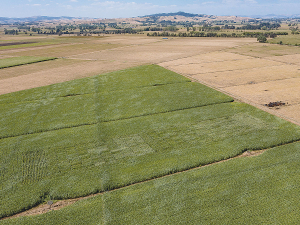Hitting heifer liveweight targets
Early December marks a key transition for many dairy farmers, as weaned replacement heifers head off-farm to grazing.
 It is times like these that the extra stack of silage or the extra paddock of maize silage prove to be very valuable.
It is times like these that the extra stack of silage or the extra paddock of maize silage prove to be very valuable.
Farming is becoming increasingly complex. Until recentyl, farmers had relatively few issues to focus on: feeding cows, producing milk and hopefully making enough money to feed their family and pay off their mortgages.
Things are very different now. The historical issues remain but added to these are increased compliance requirements, regular staff shortages, more demands from milk and meat processors, climate change and of course, global supply chain issues brought about by war and pandemics.
This increased complexity results in increased risk. Until this season, payout has been relatively stable, sitting between $6.12 and $7.54/kgMS.
The biggest business risk has been around the variable climate and trying to produce enough milk to generate good profit.
With the lure of a record payout and the hope of healthy profits, this season has been incredibly frustrating for many farmers.
The excitement of generating big profits due to the record payout has been somewhat dampened by a cold wet spring in some areas, an extended dry period in others and rising input costs across the whole industry.
It is times like these that the extra stack of silage or the extra paddock of maize silage prove to be very valuable. Stored forages like silage and drought tolerant crops like maize are great risk management tools. The advantage of an extra stack of silage is that is available for seasons like this, when it can be used to keep cows in milk and take advantage of a great payout. And if it's not needed, it can be left in the stack for when it is needed. The advantage of growing a paddock of maize silage during these periods of summer dry is that as a drought tolerant, warm loving plant, maize will produce up to three times more dry matter per hectare than pasture.
To save cost even further, consider growing maize silage grown on an effluent paddock. It is unlikely to need any fertiliser, and the maise is extremely good at mopping up excess nitrogen and potash, reducing risk to both animals and the environment. Yields also tend to be higher on effluent paddocks. As a resut, maize silage grown and harvested from effluent paddocks is a cheap source of drymatter, ranging between 13-17c/kgDM depending on the yield. There is no other stored feed on the market that comes anywhere near maize silage at this price.
Ian Williams is a Pioneer forage specialist. Contact him at This email address is being protected from spambots. You need JavaScript enabled to view it.
Voting has started for the renewal of DairyNZ's milksolids levy.
The most successful catchment groups in NZ are those that have 'a source to sea' approach.
Associate Agriculture Minister and Manawatu dairy farmer Andrew Hoggard says the free trade agreement (FTA) negotiated with India is not a bad deal and his party, Act, will support it when it goes before Parliament.
Newly released data from Environment Canterbury (ECan) Farm Environment Plan (FEP) audits are showing a dramatic lift in environmental performance across the region.
A solid recovery of global dairy prices this year makes a $9.50/kgMS milk price almost a shoo-in for this season.
As New Zealand marks the United Nations’ International Year of the Woman Farmer 2026 (IYWF 2026), industry leaders are challenging the misconception that women only support farming.
OPINION: Fonterra may be on the verge of selling its consumer business in New Zealand, but the co-operative is not…
OPINION: What does the birth rate in China have to do with stock trading? Just ask a2 Milk Company.